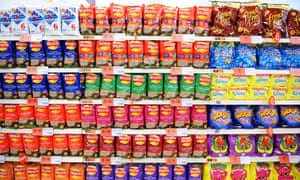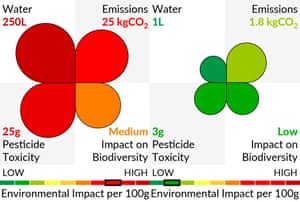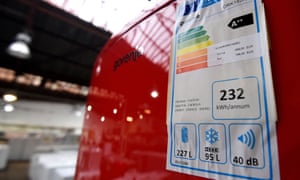https://www.theguardian.com/environment/2018/oct/10/we-label-fridges-to-show-their-environmental-impact-why-not-food?fbclid=IwAR1JQ3YNlSqRKBzOQRWUvfDLx9xKZz75BEaWO0b0rACd-qvTFsl-bVJfjB0
We label fridges to show their environmental impact – why not food?
Mandatory environmental labels would change how we produce and consume in three far-reaching ways.
If you buy a washing machine, a fridge or a television in Europe, it comes with a sticker. Thanks to a 1992 EU directive, all appliances must be labelled with their energy efficiency.
So why has our food system – which threatens 10,000 species with extinction, emits about 30% of greenhouse gases, and drives 80% of our nitrogen and phosphorus pollution – only ever had voluntary ecolabels?
The appliances ruling had a huge impact; initially, 75% of fridges and freezers were rated G to D (low efficiency), but today 98% are classed A++ or A+++. Worldwide, the energy efficiency of labelled appliances has increased three times faster than appliances without labels. Introducing an equivalent system for food could have an even bigger impact.
Mandatory environmental labels would change how we produce and consume in three far-reaching ways. First, producers would have to measure their impacts in a uniform way and be accountable for the results. This would not be expensive: it is free to monitor environmental impacts using digital tools such as Fieldprint and the Cool Farm Tool. Existing on-farm checks for subsidy payments and satellite data can validate farmer information. Olam, one of the world’s largest agricultural companies, already tracks 160,000 growers through its Farmer Information System.
Monitoring tools often reveal simple ways to reduce impacts; for example, Costco’s organic egg producers found ways to cut emissions by 13%.
And because these labels would be about results, not how the results are achieved, they would support producer choice. For example, adopting organic farming or limiting fertiliser use could reduce impacts and profits for some farms but increase them for others, depending on soil, climate and economic conditions. Providing farmers with tools to monitor impacts is a better approach than requiring they adopt certain practices. In China, a massive programme engaged 21 million smallholders: farmers who monitored and flexibly addressed their impacts reported 12% yield increases and 20% cuts in emissions compared with farmers who did not.
Second, mandatory labels support sustainable consumption. Our researchfound that products that look, taste and cost the same can have dramatically different environmental impacts. A bar of chocolate can create 6.5kg of CO2eq – the same as driving 30 miles in a car – but zero emissions if the cacao trees are growing and storing carbon. High-impact beef producers use 5,700% more land and create 1,000% more emissions than low-impact producers. Labels would allow consumers to tell these products apart.
It’s true that existing ecolabels such as Rainforest Alliance and RSPO Sustainable Palm have had limited environmental benefits and made little impact on consumer behaviour. One reason for this is that they are voluntary: producers who are already low-impact certify while high-impact producers go label-free. And voluntary labelling doesn’t leverage consumer behaviour: shoppers are more likely to stop buying brands they perceive as unethical than to start buying those they perceive to be ethical. Further, about 460 of these voluntary labels exist and consumer recognition is generally low.
Mandatory labels would highlight both high- and low-impact producers, in the same way, across multiple products. This would encourage more people to think about their choices by exposing them to the facts every time they are in the shops. And this really matters, because we need more serious action than individuals simply choosing a different chocolate bar.
Worldwide adoption of plant-based diets would mean we would need 3.1bn hectares less farmland, an area the size of Africa. This would take pressure off the world’s last remaining natural ecosystems and could see vast areas rewilded. Global greenhouse gas emissions would be 7bn tonnes a year lower. As trees regrew on old fields, they would remove an additional 6bn tonnes of CO2 a year from the atmosphere over 20 years. In total, this would mean a 25% reduction in emissions. Plant-based diets would also cut our nitrogen and phosphorus pollution in half and water scarcity by a quarter, and significantly reduce antibiotic and pesticide use.
We can also use labels to turn smaller consumer changes into large environmental benefits: because a small number of producers create a disproportionate share of the impact, simply avoiding high-impact producers can make a huge contribution to emission reductions.
Third, mandatory environmental labels would create information about the food system, and today this information is scarce. This could underpin better policy, particularly taxes or subsidies linked to actual environmental harm. When choosing energy-efficient appliances, consumers rank environmental issues about equally with future cost savings. In the long term, better financial incentives will be required in food too. These incentives would also encourage producers to innovate and change their practices. This is possible: more than $0.5tn of subsidies is distributed to farmers each year, but little of that money is linked to environmental issues.
What we need now is for our leaders to implement mandatory environmental labelling. This would reward sustainable companies, enable sustainable eating and support better policymaking. This relatively simple but powerful change could be instrumental in halting and reversing the escalating degradation of our imperilled planet.
• Joseph Poore researches agriculture and the environment at the University of Oxford.
Since you’re here …
… we have a small favour to ask. More people are reading The Guardian’s independent, investigative journalism than ever but advertising revenues across the media are falling fast. And unlike many news organisations, we haven’t put up a paywall – we want to keep our reporting as open as we can. So you can see why we need to ask for your help.
The Guardian is editorially independent, meaning we set our own agenda. Our journalism is free from commercial bias and not influenced by billionaire owners, politicians or shareholders. No one edits our editor. No one steers our opinion. This is important because it enables us to give a voice to the voiceless, challenge the powerful and hold them to account. It’s what makes us different to so many others in the media, at a time when factual, honest reporting is critical.
If everyone who reads our reporting, who likes it, helps to support it, our future would be much more secure. For as little as $1, you can support the Guardian – and it only takes a minute. Thank you.




沒有留言:
張貼留言